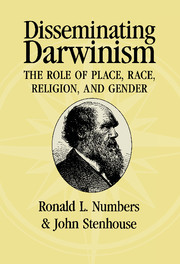Book contents
- Frontmatter
- Contents
- List of contributors
- Acknowledgments
- Introduction
- 1 Science, region, and religion: the reception of Darwinism in Princeton, Belfast, and Edinburgh
- 2 Darwin down under: science, religion, and evolution in Australia
- 3 Darwinism in New Zealand, 1859–1900
- 4 Environment, culture, and the reception of Darwin in Canada, 1859–1909
- 5 Darwinism in the American South
- 6 Darwinism, American Protestant thinkers, and the puzzle of motivation
- 7 Exposing Darwin's “hidden agenda”: Roman Catholic responses to evolution, 1875–1925
- 8 American Jewish responses to Darwin and evolutionary theory, 1860–1890
- 9 Black responses to Darwinism, 1859–1915
- 10 “The irrepressible woman question”: women's responses to evolutionary ideology
- Index
Introduction
Published online by Cambridge University Press: 06 July 2010
- Frontmatter
- Contents
- List of contributors
- Acknowledgments
- Introduction
- 1 Science, region, and religion: the reception of Darwinism in Princeton, Belfast, and Edinburgh
- 2 Darwin down under: science, religion, and evolution in Australia
- 3 Darwinism in New Zealand, 1859–1900
- 4 Environment, culture, and the reception of Darwin in Canada, 1859–1909
- 5 Darwinism in the American South
- 6 Darwinism, American Protestant thinkers, and the puzzle of motivation
- 7 Exposing Darwin's “hidden agenda”: Roman Catholic responses to evolution, 1875–1925
- 8 American Jewish responses to Darwin and evolutionary theory, 1860–1890
- 9 Black responses to Darwinism, 1859–1915
- 10 “The irrepressible woman question”: women's responses to evolutionary ideology
- Index
Summary
In 1859 the English naturalist Charles Darwin, a resident of Down outside of London, published his controversial views on the origin of species. In a landmark book entitled On the Origin of Species by Means of Natural Selection, he argued against the conventional notion that God had supernaturally created the original types of plants and animals and in favor of the idea that they had evolved naturally over long periods of time primarily, though not exclusively, by means of random variation and natural selection. News of his heretical views spread rapidly, and before long even the citizens of such remote outposts of British civilization as Dunedin, New Zealand, halfway around the globe from Down and home of the southernmost university in the world, were debating the merits of Darwinism.
The essays in this volume focus specifically on the ways in which geography, gender, race, and religion influenced responses to Darwin. Chronologically, they span the period from the publication of the Origin to the 1930s, when Darwin's theory of natural selection finally captured the allegiance of the scientific community. Geographically, they concentrate on the English-speaking world, especially Canada, Australia, New Zealand, and the United States. Although historians of science have been examining Darwin's influence for decades and have produced a number of notable studies, our knowledge of how various groups and regions responded to Darwinism remains spotty. For example, despite the availability of such works as Thomas F. Glick's Comparative Reception of Darwinism (1974) and the section “Towards the Comparative Reception of Darwinism” in David Kohn's Darwinian Heritage (1985) – neither of which covers Australia, New Zealand, or Canada – we still know relatively little about the role of locale in affecting responses to Darwin.
- Type
- Chapter
- Information
- Disseminating DarwinismThe Role of Place, Race, Religion, and Gender, pp. 1 - 6Publisher: Cambridge University PressPrint publication year: 1999

